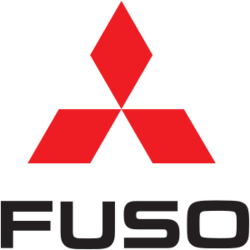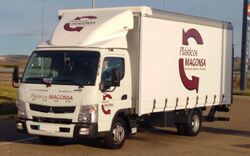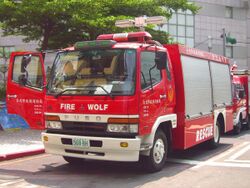Company:Mitsubishi Fuso Truck and Bus Corporation
 | |
Native name | 三菱ふそうトラック・バス株式会社 |
|---|---|
| Type | KK |
| Industry | Commercial vehicles |
| Founded | 1932 |
| Headquarters | Saiwai-ku, Kawasaki, Kanagawa, Japan |
Key people | |
| Products | Buses and trucks |
| Revenue | $7.6 billion (2010) |
| Owner |
|
Number of employees | About 10,000 (December 2015)[1] |
| Parent | Daimler AG |
| Subsidiaries | Mitsubishi Fuso Truck of America, Inc. |
| Website | mitsubishi-fuso |

The Mitsubishi Fuso Truck and Bus Corporation (Japanese: 三菱ふそうトラック・バス株式会社 Hepburn: Mitsubishi Fusō Torakku・Basu Kabushiki gaisha) is a manufacturer of trucks and buses. It is headquartered in Kawasaki, Kanagawa, Japan. Currently, it is 89.29 %-owned by Germany-based Daimler AG, under the Daimler Trucks division.[2]
Fuso derives from the ancient Chinese term Fusang, for a sacred tree said to grow at the spot in the East where the sun rises, and has been used to refer to Japan itself. The actual Fuso tree is a hibiscus.
History
In 1932, the first B46 bus (the Fuso) was built at the Mitsubishi Shipbuilding Company's Kobe Works. Two years later, the Mitsubishi Shipbuilding Company was renamed Mitsubishi Heavy Industries (MHI). Three years after that, the MHI motor-vehicle operations at the Kobe Works were transferred to the Tokyo Works.
In 1949, the Fuso Motors Sales Company was established; it was renamed the Mitsubishi Fuso Motors Sales Company in 1952. In 1950, Mitsubishi Heavy Industries was split into three companies: East Japan Heavy Industries, Central Japan Heavy Industries and West Japan Heavy Industries. Two years later, Central Japan Heavy Industries was renamed Shin Mitsubishi Heavy Industries; West Japan Heavy Industries was renamed Mitsubishi Shipbuilding and Engineering Company and East Japan Heavy Industries was renamed Mitsubishi Nippon Heavy Industries (MNHI). Products from the companies were distributed by Mitsubishi Fuso Motor Sales because of brand recognition.
In 1957, MNHI integrated the Tokyo and Kawasaki Works into the Tokyo Motor Vehicle Works. Seven years later, Mitsubishi Nippon Heavy Industries, Shin Mitsubishi Heavy Industries and Mitsubishi Shipbuilding and Engineering Company merged to form Mitsubishi Fuso Heavy Industries; Mitsubishi Fuso Motors Sales split into two divisions: Shin and Fuso Motors Sales Company. Sharing a logo, they split the distribution of heavy and light machinery; Shin distributed light machinery branded as Mitsubishi, and Fuso distributed heavy machinery branded as Fuso. In 1970 MHI signed a joint-venture agreement with Chrysler Corporation, establishing the Mitsubishi Motors Corporation (MMC), and MHI transferred its motor-vehicle operations to MMC.
In 1975, MMC opened the Nakatsu Plant at its Tokyo Motor Vehicle Works; five years later, it opened the Kitsuregawa Proving Grounds. Four years after that, MMC merged with Mitsubishi Motor Sales Company. In 1985, MMC and Mitsubishi Corporation established the joint-equity company Mitsubishi Trucks of America in the United States. Eight years later, MMC and Chrysler dissolved their equity partnership. The following year, MMC and Mitsubishi joined to design, build and distribute the Mitsubishi Lancer.
In 1999 MMC and Volvo joined their truck and bus operations, and Volvo acquired five percent of MMC. Two years later, DaimlerChrysler replaced Volvo as MMC's truck and bus partner and MMC renamed the Tokyo Plant the Truck and Bus Production Office (also known as the Kawasaki Plant).
In 2003, the Mitsubishi Fuso Truck and Bus Corporation (MFTBC) was established. DaimlerChrysler, Mitsubishi Motors Corporation and other Mitsubishi companies acquired 43-, 42- and 15-percent shares, respectively, in MFTBC. In 2005, Mitsubishi Motors Corporation transferred its MFTBC shares to DaimlerChrysler as part of their compensation agreement for financial damages resulting from quality problems and recalls at MFTBC. DaimlerChrylser and the Mitsubishi companies hold shares of 89 and 11 percent, respectively. In 2006, MFTBC moved its headquarters from Tokyo to Kawasaki-shi, Kanagawa; the following year, DaimlerChrysler sold its majority stake in Chrysler Corporation to Cerberus Capital Management. The corporation was renamed Daimler AG, and the DaimlerChrysler Truck Group was renamed Daimler Trucks; MFTBC is part of the Daimler Trucks Division of Daimler AG.
Facilities
Fuso trucks are developed and built primarily at the following Japanese facilities:
- Kitsuregawa Proving Ground
- Kawasaki Plant and Research and Development Center
- Nakatsu Plant, Aikawa, Kanagawa[3]
- Mitsubishi Fuso Bus Manufacturing Company in Toyama, Toyama

Mitsubishi Fuso Canter work trucks are manufactured in Egypt, Portugal, The Philippines, Venezuela, Turkey, and Russia. They are marketed in Japan, Europe, Australia, New Zealand, Indonesia and a number of other Asian countries, as well as in the United States.
They are also manufactured in India at the Daimler India Commercial Vehicles plant in Oragadam, near Chennai. Those vehicles are sold in East Africa and Southeast Asia.[4] Mitsubishi Fuso's European marketing and sales headquarters is in Stuttgart.
Products

Domestic
Truck
- Canter
- Canter Guts (Canter Mini)
- Canter Eco Hybrid
- Fighter
- The Great
- Super Great
Bus

- Rosa
- Aero Midi
- Fuso Aero Midi MK
- Fuso Aero Midi MJ
- Fuso Aero Midi ME
- Aero Star
- Aero Queen
- Aero King
- Aero Bus
- Aero Ace
- Mitsubishi Cruiser[5]
- Mitsubishi Eagle
Export
Van
- Canter Van (OEM Nissan Caravan)
Truck

- Fuso FB (Canter Mini)
- Fuso FC (Canter)
- Fuso FE (Canter), formerly also rebadged and sold as the Sterling 360
- Fuso FG (Canter 4WD)
- Fuso FH (Canter Hi)
- Fuso FK (Fighter)
- Fuso FM (Fighter Hi)
- Fuso FL (Fighter 4WD)
- Fuso FP/FS/FV (Super Great/Heavy Duty)
- Fuso Shogun (manufactured in New Zealand)
- Fuso FJ (manufactured in India for export)[4]
- Fuso TV (manufactured in Malaysia and Thailand)
Bus


- Fuso Rosa
- Fuso MK (Aero Midi)
- Fuso MP (New Aero Star) non-step Diesel & CNG
- Fuso MS (Aero Bus/Aero Queen)
- Fuso BK125L (Bus chassis)
- Fuso BM115/116/117/118 (Bus chassis)
- Fuso RK (Bus chassis)
- Fuso RM (Bus chassis)
- Fuso RP (Bus Chassis)
Other
- Industrial engines
Electric transport
The Mitsubishi Fuso Aero Star diesel-electric bus is being tested in Japan. According to the company, it can reduce fuel consumption by as much as 30 percent.[6] The Aero Star uses a series hybrid drive, where its diesel engine drives an electric generator to recharge lithium-ion batteries[7] connected to the two electric motors with a combined output of 158 kW which propel the vehicle.[2] Daimler Trucks use this system for most of their hybrid commercial vehicles, including in the Mitsubishi Fuso Canter Eco Hybrid; series hybrids are efficient on urban buses.[7]
Global distribution
Outside Japan , vehicles manufactured by the corporation are sold in:
- United States , Canada and Puerto Rico by Mitsubishi Fuso Truck of America, Inc. in Logan Township, New Jersey
- Latin America by Mitsubishi Motors, Daimler and independent dealers
- Asia by Mitsubishi Motors, Daimler and independent dealers
- Middle East by Mitsubishi Motors and independent dealers
- Africa by Mitsubishi and independent dealers, in Rwanda by Akagera Business Group
- Oceania by Daimler-Mercedes-Benz, Mitsubishi Motors, Fuso and independent dealers
- Europe by Mitsubishi Motors, Daimler-Mercedes-Benz and independent dealers
See also
- Daimler AG
References
- ↑ "Corporate profile". Mitsubishi Fuso Truck and Bus Corporation. http://www.mitsubishi-fuso.com/content/fuso/en/aboutus/corporate_profile/index.html. Retrieved June 30, 2018.
- ↑ 2.0 2.1 [1]
- ↑ Mitsubishi Fuso Plant
- ↑ 4.0 4.1 Daimler Trucks Operations in Asia Premieres FUSO FJ Fuso Press release, September 24, 2014. Retrieved November 2, 2014.
- ↑ "Ghabbour Auto". Ghabbour Auto. April 19, 2012. http://www.ghabbourauto.com/. Retrieved May 4, 2016.
- ↑ [2]
- ↑ 7.0 7.1 [3]
External links
- Mitsubishi Fuso International website
- Mitsubishi Fuso Australia Fuso Australia website
- Mitsubishi Fuso South Africa Fuso South Africa website

